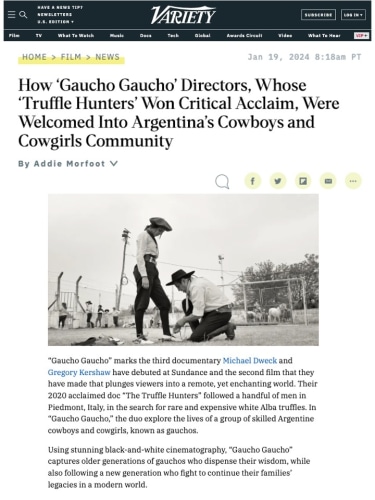How ‘Gaucho Gaucho’ Directors, Whose ‘Truffle Hunters’ Won Critical Acclaim, Were Welcomed Into Argentina’s Cowboys and Cowgirls Community
Variety
01/19/2024
Back
By Addie Morfoot
“Gaucho Gaucho” marks the third documentary Michael Dweck and Gregory Kershaw have debuted at Sundance and the second film that they have made that plunges viewers into a remote, yet enchanting world. Their 2020 acclaimed doc “The Truffle Hunters” followed a handful of men in Piedmont, Italy, in the search for rare and expensive white Alba truffles. In “Gaucho Gaucho,” the duo explore the lives of a group of skilled Argentine cowboys and cowgirls, known as gauchos.
Using stunning black-and-white cinematography, “Gaucho Gaucho” captures older generations of gauchos who dispense their wisdom, while also following a new generation who fight to continue their families’ legacies in a modern world.
It took two years to film and edit the 143 shots featured in the 85-minute doc.
Variety spoke to Dweck and Kershaw ahead of the film’s Jan. 19 premiere.
How did you manage to gain the trust of a very small, very tight Argentinian community?
Kershaw: Life there revolves around the asado (a social gathering based around a meal). That’s the mechanism for all socialization, so that’s where the initial meetings took place. It wasn’t just about eating. There is a whole ritual around it. It’s the preparation of the food, which takes hours. It’s the drinking of the mate and the wine. Then after the asados, they sing these really beautiful songs where they recount what happened that day sometimes, or they recount the stories of the past and stories of their ancestors. It’s a way of passing on the traditions. So you do enough of those and you start to learn things. It’s not just meeting the people. You start to learn about what happened in the past, what happened during the day. And that’s where you get the first hints of where the stories might be and what to follow.
So when you started working on the project in December 2021, you didn’t have any story in mind?
Dweck: We don’t really have a story in mind going into these projects. We just really feel that there is something there that’s worth exploring. Then we dig deeper and immerse ourselves into the community as these stories, hopefully, come out.
Kershaw: What we tend to learn on every project is that there are just incredible humans wherever you go. As different as (the gaucho) world is, there are these similarities that transcend all of humanity and connect us.
The first shot of the film, which features the gauchos riding their horses over very rugged terrain, is so beautifully captured. How did you do it?
Dweck: We trucked a high-speed camera car across the country — 25 hours from Bueno Aires. Then we rigged a camera with a stabilizer on the end of this thing. We wanted the audience to feel what it’s like to be on a horse.
In the doc you feature a strong-willed female gaucho, Guada Gonza. Did you know going into this project that you wanted to capture at least one female in a very male-dominated world?
Dweck: No.
Kershaw: [Her father] Tati kind of pushed her forward. We came there to talk to Tati, but he pushed her forward because I think he understood how extraordinary she is. It’s very rare to have a female gaucho. He wanted to celebrate her. When we started this project we had no preconceptions of what the story was, or who we were going to follow. We find people that are fascinating, and we found her story fascinating.
Why did you decide to make the film in black and white?
Dweck: Everything is rooted in how do we bring the audience into the feeling of this place? How do we bring the audience into the experience of this place? We experimented a little bit in the beginning when we were shooting with different ways of thinking about frames and movement. The black and white just clicked.
With the success of “The Truffle Hunters,” which Sony Picutres Classics acquired for a reported $1.5 million in 2020, did you ever consider making “Gaucho Gaucho” with a major streamer instead of independently?
Kershaw: We had thought about that, but we didn’t end up going with a distributor. We have such a unique way of working and we just have such great relationships with all of our investors who completely support our way of working.
Dweck: It’s also hard to pitch a story to a streamer or a distributor when you don’t know what the story is yet. It’s like, “What’s the story?” And we say, “Gauchos.” And they say, “No, really. What’s the story?” And we go, “We just told you — gauchos.” It’s a one-word pitch deck.